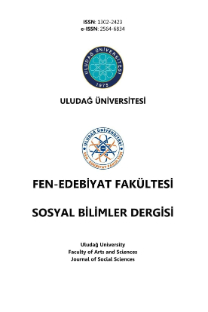RUS DİLİNDE MESLEK İSİMLERİNİN KELİME YAPIM AÇISINDAN İNCELENMESİ (SON EKLİ ÖRNEKLERDE)
Bu çalışmada Rus dilinde meslek ifade eden isimlerin, kelime yapım açısından, son ek yardımıyla oluşumu üzerinde durulmaktadır. Rus dili genel dil bilgisi kuralı gereği, ilk olarak fiilden, sıfattan ve isimden eril cinsiyette meslek ismi yapmaya yardımcı son ekler tespit edilmektedir. Daha sonra, eril cinsiyetteki meslek isminden modifiye olan kadın meslek isim son ekleri, sadece kadın meslek isimlerini ifade eden son ekler ve hem erkek hem de kadınlar için ortak kullanılan meslek isim son ekleri tespit edilmeye çalışılmaktadır. Tespit edilen meslek isim son ekleri üretken olup olmamalarına göre sınıflandırılmaktadır. Ayrıca 21. yy. başında ortaya çıkan ve meslek ismi yapmaya yardımcı olan son ekler de tespit edilmektedir. Çalışmanın sonuç kısmında meslek ismi yapmaya yardımcı olan son eklerin sayısal oranı verilerek, sözcük türlerinden sırasıyla isimlerin, fiillerin ve son olarak sınırlı sayıda sıfatların meslek ifade eden isimleri yapmada etkili olduğu saptanmaktadır.
Examination of the Profession Nouns in Russian Language in terms of Word Formation (In the Examples of Suffixes)
In this study, it is emphasized the profession nouns in Russian language are formed with the help of the suffix in terms of word formation. In accordance with the general grammar rule of the Russian language, firstly, the masculine profession nouns in terms of suffixes of the verbs, adjectives and nouns are identified. Then, the feminine profession nouns modified from the masculine profession nouns, the suffixes expressing only the feminine profession nouns and the common suffixes used for both masculine and feminine profession nouns are determined. Moreover, the professional noun suffixes identified are classified whether they are productive or not. In addition, the new profession nouns in terms of suffixes emerged at the beginning of the 21st century is also identified. In the final section of the article, providing the numerical ratio of the profession noun suffixes, it is determined that the nouns, verbs and finally a limited number of adjectives from the word types are effective in obtaining the profession nouns, respectively.
___
- Aleş, Brandner (2003). “Osobennosti vırajeniya kategoriy roda u oduşevlennıh suşestvitelnıh v russkom i çeşskom yazıkah”. Sbornik Praci Filosofiske Fakulty. Brnenske univerzity Studia minora fakultatis philosophicae universitatis brunensis. Linguistica brunensia. A 51: 13- 24.
- https://digilib.phil.muni.cz/bitstream/handle/11222.digilib/100022/A_Li nguistica_51-2003-1_3.pdf?sequence=1 (Erişim Tarihi: 08.11.2018).
- Berkutova, Veronika (2018). “Feminitivı v russkom yazıke: lingvistiçeskiy aspekt”. Svobodnoye psihoanalitiçeskoye partnerstvo. https://www.psypart.com/feminitivy-lingvisticheskii-aspect (Erişim Tarihi: 28.10.2018).
- Bombit’ (2018). https://argo.academic.ru/540/бомбить (Erişim Tarihi: 18.12.2018).
- Cuto, Eugenija (2005). “Rod imen suşestvitelnıh v nazvaniyah professiy”. Croatica Et Slavica Iadertina (1): 135-151.
- Diyakronik ve Senkronik (2018). www.tdk.gov.tr (Erişim Tarihi: 30.10.2018).
- Engizisyon, Tahkimat vb. (2018). www.tdk.gov.tr (Erişim Tarihi: 28.11.2018).
- Graudina, Lyubov (2001). Kultura russkoy reçi: uçebnik dlya vuzov. Moskva: Norma.
- İvanova, Vera vd. (1990). Zamenitelno o russkom yazıke: Posobiye dlya uçitelya. Leningrad: Prosveşeniye.
- Klobukov, Evgeniy (2013). “Slovoobrazovaniya”. Sovremennıy russkiy literaturnıy yazık. Pod. red. P.A. Lekanta. Moskva: Ast-Press Kniga: 343-401.
- Kuznetsov, Sergey (2000). Bolşoy tolkovıy slovar russkogo yazıka. Pod red. S.A. Kuznetsova. Sankt-Peterburg: Norint.
- Şvedova, Natalya vd. (1980). Russkaya grammatika. T. 1.: Fonetika, Fonologiya, Udareniye, İntonatsiya, Slovoobrazovaniye, Morfologiya. Moskva: Nauka.
- Tihonov, Aleksandr (1990). Slovoobrazovatelnıy slovar russkogo yazıka. V dvuh tomah. Moskva: Russkiy yazık.
- Tolkovoy slovar russkogo yazıka naçala XXI veka. Aktualnaya leksika (2006). Pod. red. G.N. Sklyarevskoy. Мoskva: Eksmo.
- Vinogradov, Viktor vd. (1960). Grammatika russkogo yazıka. T. 1. Fonetika i morfologiya. İnstitut russkogo yazıka. Moskva: Akademiya nauk SSSR.
- Vinokur, Grigoriy (1959). “Zametki po russkomu slovoobrazovaniyu”. İzbrannıye rabotı po russkomu yazıku. Moskva: Gosudarstvennoye uçebno-pedagogiçeskoye izdatelstvo Ministerstva prosveşeniya RSFSR. s. 417-442.
- Zaliznyak, Andrey (2007). Grammatiçeskiy slovar russkogo yazıka. Moskva: Russkiye Slovari.
- ISSN: 1302-2423
- Yayın Aralığı: Yılda 2 Sayı
- Başlangıç: 1999
- Yayıncı: Bursa Uludağ Üniversitesi
Sayıdaki Diğer Makaleler
PABLO CASALS’IN 20. YÜZYIL MÜZİK DÜNYASINA ETKİLERİ
ROMA DÖNEMİNDE LYKAONİA BÖLGESİ SU TANRISI KÜLTLERİ
İKLİM DEĞİŞİKLİĞİ İNKÂRININ SOSYAL BASKINLIK YÖNELİMİ VE EKOLOJİK ADİL DÜNYA İNANCI İLE İLİŞKİSİ
GÖZDE KIRAL UÇAR, Meral GEZİCİ YALÇIN, GAMZE ÖZDEMİR
BALIKESİRLİ RÂSİH VE BÜLGATÜ’L-AHBÂB ADLI ESERİ
BURSA’NIN TAHIL PAZARI VE GALLE HANI
Çoklu Medya Görevi ile Çalışma Belleği ve Sürekli Dikkati İlişkisi
Mine İMREN, Hasan Gürkan TEKMAN
SOSYOLOJİK BAKIŞ AÇISINDAN GIDA GÜVENCESİ KAVRAMI
THE RELATIONSHIP BETWEEN MEDIA MULTITASKING, WORKING MEMORY AND SUSTAINED ATTENTION
